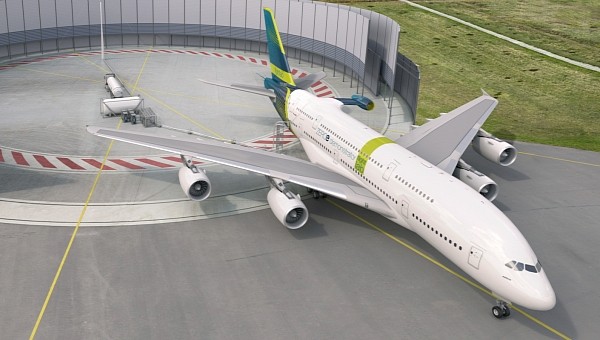Main aircraft builders from around the world are working to find the best solution for a sustainable aviation future with zero-emission airplanes that can fly enough distances to not look mundane. Airbus just unveiled its prototype engine that might be part of the solution.
While creating sustainable aviation fuel is not a bad idea at all, Airbus considers that it can do better than that. After all, the European multinational corporation has a huge experience in this area. It is worth noting that the Airbus A320 aircraft is the most-produced civilian airliner in the world. Moreover, its research in helicopters or unmanned air vehicles (UAV) is advanced. But none of these achievements slowed the European giant. And now, they unveiled this: the ZEROe Fuel Cell Engine.
But don't think that it will start low with some light aircraft. Instead, it will go on with the big A380 MSN1 flight test airplane. At the time of press, the bird was going through some changes to carry liquid hydrogen tanks and other equipment associated with this new technology.
The aircraft maker knows that hydrogen can be used for combustion in a gas turbine. Yet, that might not be the best choice, but it is not off the table. Another way of using hydrogen is via fuel cells and generate electricity, which will power a propeller engine. A third option would be a hydrogen gas turbine coupled with fuel cells instead of batteries and form a hybrid-electric system.
When hydrogen fuel cells are stacked together, their power increases, allowing scalability. Using this system will lead to zero NOx emissions and, moreover, will almost cancel contrails.
Glenn Llewellyn, VP Zero-Emission Aircraft, Airbus. "At scale, and if the technology targets were achieved, fuel cell engines may be able to power a one hundred passenger aircraft with a range of approximately 1,000 nautical miles (1852 km/1151 miles). By continuing to invest in this technology we are giving ourselves additional options that will inform our decisions on the architecture of our future ZEROe aircraft, the development of which we intend to launch in the 2027-2028 timeframe."
However, Airbus didn't reach this results overnight. After searching various fuel cell producers from around the world, it found a German company named ElringKlinger, which was involved in developing such systems for over two decades. Together, they formed a joint venture named Aerostack. Its aim was to produce a fuel cell capable enough to provide the energy required by an aircraft and light enough to be taken onboard.
In December 2020, Airbus unveiled its pod concept for a fuel cell propeller propulsion system. After that, it continued its work through trial and error and achieved this: the ZEROe Fuel Cell engine, which might get into production by the end of this decade. Airbus' success in this domain convinced the French automaker Renault, which is allied with Nissan, to create future fuel cells for the automotive industry.
But don't think that it will start low with some light aircraft. Instead, it will go on with the big A380 MSN1 flight test airplane. At the time of press, the bird was going through some changes to carry liquid hydrogen tanks and other equipment associated with this new technology.
The aircraft maker knows that hydrogen can be used for combustion in a gas turbine. Yet, that might not be the best choice, but it is not off the table. Another way of using hydrogen is via fuel cells and generate electricity, which will power a propeller engine. A third option would be a hydrogen gas turbine coupled with fuel cells instead of batteries and form a hybrid-electric system.
When hydrogen fuel cells are stacked together, their power increases, allowing scalability. Using this system will lead to zero NOx emissions and, moreover, will almost cancel contrails.
Glenn Llewellyn, VP Zero-Emission Aircraft, Airbus. "At scale, and if the technology targets were achieved, fuel cell engines may be able to power a one hundred passenger aircraft with a range of approximately 1,000 nautical miles (1852 km/1151 miles). By continuing to invest in this technology we are giving ourselves additional options that will inform our decisions on the architecture of our future ZEROe aircraft, the development of which we intend to launch in the 2027-2028 timeframe."
However, Airbus didn't reach this results overnight. After searching various fuel cell producers from around the world, it found a German company named ElringKlinger, which was involved in developing such systems for over two decades. Together, they formed a joint venture named Aerostack. Its aim was to produce a fuel cell capable enough to provide the energy required by an aircraft and light enough to be taken onboard.
In December 2020, Airbus unveiled its pod concept for a fuel cell propeller propulsion system. After that, it continued its work through trial and error and achieved this: the ZEROe Fuel Cell engine, which might get into production by the end of this decade. Airbus' success in this domain convinced the French automaker Renault, which is allied with Nissan, to create future fuel cells for the automotive industry.






